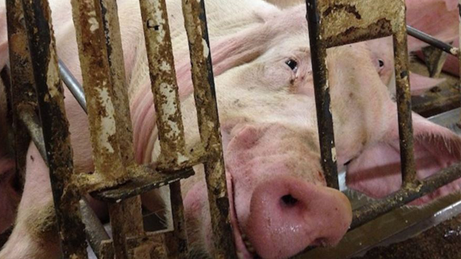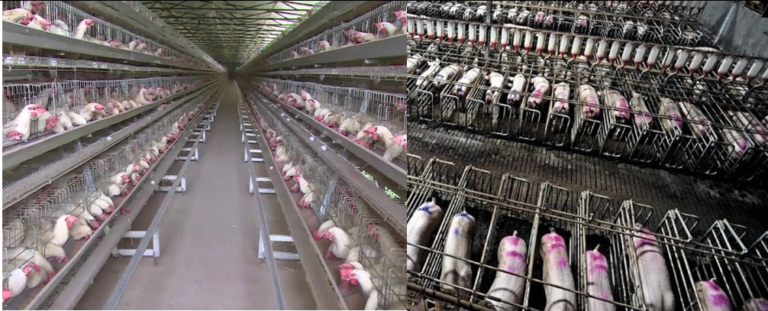
PROP 12: Law Banning Gestation Crates Faces Industry Proposition, But We Aren’t Backing Down
By Kate Schultz
Senior Attorney, Animal Wellness Action
Ever since the people of the state of California passed Proposition 12 in 2018 by an overwhelming margin, the commercial pork industry has been trying to undo this clear expression of voter will through legal maneuvering.
Prop 12 bans the sale in California of pork and eggs from animals raised in cruel confinement conditions. The vast majority of pork eaten in the United States comes from female pigs who, while pregnant, are kept in undersized enclosures called gestation crates.
They spend the few years of their short lives almost entirely in cages barely large enough to fit their bodies.
It is an intensive farming system that denies basic protections and dignities to breeding sows who are kept constantly pregnant. They spend the few years of their short lives almost entirely in cages barely large enough to fit their bodies.
In addition, intensive farming of large numbers of animals in close quarters is a potential incubating ground for zoonotic diseases and future pandemics.
This past March, the Supreme Court of the United States granted the pork industry’s request to review the industry’s most recent loss in the Ninth Circuit. As recently as June 2021, the Supreme Court had declined to review a similar lawsuit from the North American Meat Institute to strike down the same law.
But the 2022 Court seems more ready to play ball with the pork industry and entertain its challenge to Prop 12, even while dozens of private companies, including major players like McDonald’s and Costco, have pledged to phase out suppliers that use gestation crates.
Even though big players in the industry are gradually bending to consumer will, the ones that refuse are stubbornly – and incorrectly – claiming that compliance with Prop 12 will be so difficult and costly as to be an unconstitutional burden on interstate commerce.
This case is about much more than humane farming standards. Should the Supreme Court reverse the lower court in National Pork Producers Council v. Ross, it would threaten to affect decades of dormant Commerce Clause jurisprudence. In turn, this would endanger countless state laws across the country that protect citizens’ health and safety, the environment, and even conservation.

Unfortunately, this current iteration of the Supreme Court seems very willing to undo well-established caselaw on a number of fronts, and the ability of states to protect their own citizens might be one of those areas.
We plan to join numerous other stakeholders in encouraging the Supreme Court to uphold Prop 12 by filing an amicus brief that underscores the rights of states to enact these kinds of protective provisions. The Supreme Court must abide by longtime American legal precedent that protects states’ rights to make laws in accordance with the states’ constitutionally delegated powers.
Other NLEC News

In addition, intensive farming of large numbers of animals in close quarters is a potential incubating ground for zoonotic diseases and future pandemics.